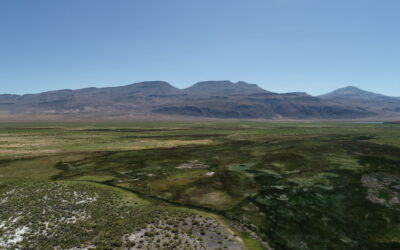Reno, Nev. (July 19, 2021) – Scientists with the Desert Research Institute (DRI) Organic Analytical Laboratory, led by Andrey Khlystov, Ph.D., have been awarded a $1.5M grant from the National Institutes of Health (NIH) to study the formation of dangerous compounds by electronic cigarettes (e-cigarettes).
E-cigarettes have grown in popularity in recent years, and emit nicotine and other harmful compounds including formaldehyde, a dangerous human carcinogen. However, the production of these chemicals may differ across different e-cigarette devices, use patterns, and e-liquid (“juice”) formations – and scientists currently lack a thorough understanding of how these chemicals form and how to best test for their presence.
DRI’s study, which will run for three years, will test popular e-cigarette types and devices under a wide range of use patterns to resolve questions about harmful and potentially harmful substances produced by e-cigarettes. Among other things, the research team will investigate interactions between flavoring compounds and coils at different ages, temperatures, and e-liquid formations, and how different combinations of power, puff topography, and e-liquid viscosity affect emissions.
“This project will identify the most important parameters underlying the formation of harmful and potentially harmful constituents produced by e-cigarettes – and thus help inform the public and policymakers regarding health safety of different e-cigarette devices and e-liquid formulations,” Khlystov said.
Information gained from this project is needed to advise the public on potential health risks of different devices and configurations, to establish standardized testing protocols, and to inform policymakers on regulating certain e-cigarette designs and/or e-liquid constituents.
Additional Information:
- For more information on DRI’s Organic Analytical Laboratory, please visit: https://www-dev.dri.edu/labs/oal/
- For more information on Andrey Khlystov, Ph.D., and his research, please visit: https://www-dev.dri.edu/directory/andrey-khlystov/
###
About DRI:
The Desert Research Institute (DRI) is a recognized world leader in basic and applied environmental research. Committed to scientific excellence and integrity, DRI faculty, students who work alongside them, and staff have developed scientific knowledge and innovative technologies in research projects around the globe. Since 1959, DRI’s research has advanced scientific knowledge on topics ranging from humans’ impact on the environment to the environment’s impact on humans. DRI’s impactful science and inspiring solutions support Nevada’s diverse economy, provide science-based educational opportunities, and inform policymakers, business leaders, and community members. With campuses in Las Vegas and Reno, DRI serves as the non-profit research arm of the Nevada System of Higher Education. For more information, please visit www.dri.edu.


